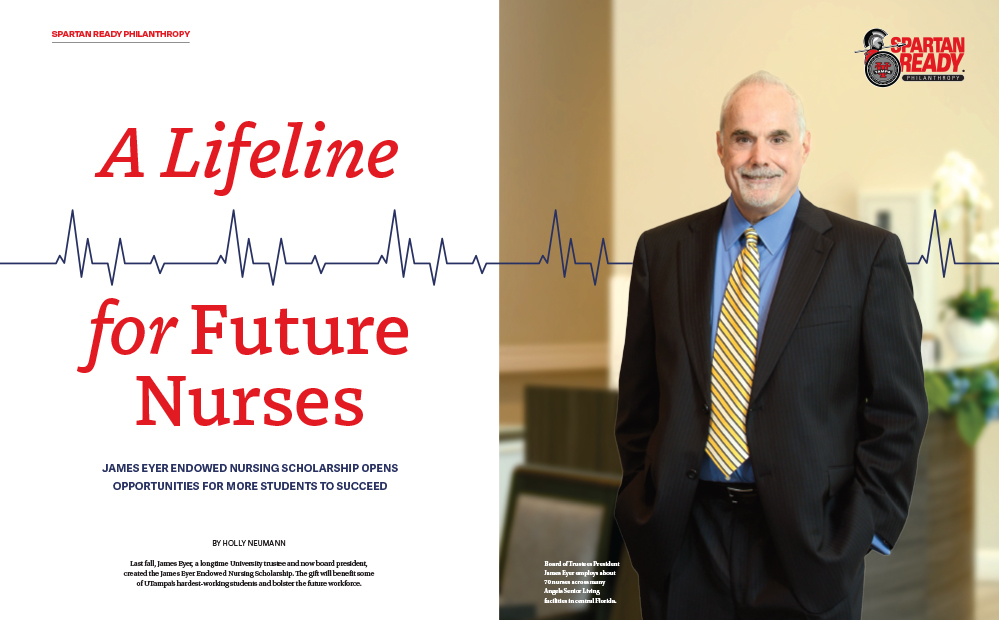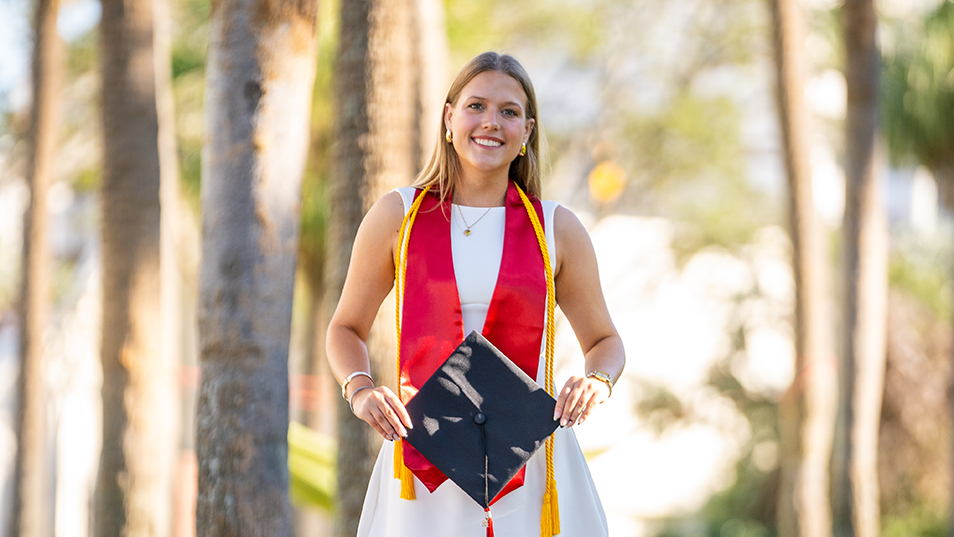They're going to get a lot of joy from what they do in life, knowing that they helped take care of people.
A Lifeline for Future Nurses
James Eyer Endowed Nursing Scholarship opens opportunities for more students to succeed

Board of Trustees President James Eyer employs about 70 nurses across many Angels Senior Living facilities in central Florida. Photo by Jessica Leigh
Last fall, James Eyer, a longtime University trustee and now board president, created the James Eyer Endowed Nursing Scholarship. The gift will benefit some of UTampa’s hardest-working students and bolster the future workforce.
Eyer knows well the demands nursing students face and the pressures that await them in their chosen careers, as he employs about 70 nurses across the many Angels Senior Living facilities he owns and operates in central Florida. “Nurses are the backbone of our company,” he said.
He has seen nursing students juggle classwork and clinicals, leaving little time for anything else, like a part-time job that might help pay for necessities or co-curriculars that round out an education. He's also experienced the challenges of being an employer during the protracted, nationwide nursing shortage.
The Eyer Endowed Nursing Scholarship will provide support where it can make a huge difference for both these problems — on an individual level.
Eyer wants to help “get young people excited about nursing again,” and he has one great hope for those individuals: “For them to look in the mirror and say, ‘I did something good every single day.’ They’re going to get a lot of joy from what they do in life, knowing that they helped take care of people,” he said.

James Eyer, center, shown at the scholarship announcement ceremony in 2023, wants to help “get young people excited about nursing again." Photo by Jessica Leigh
OPTIONS OPEN UP
New grad Evie Sly ’24, now a surgical ICU nurse at Moffitt Cancer Center’s McKinley Hospital, says it was scholarships like Eyer’s that allowed her to thrive in UTampa’s nursing program.
In Sly’s final semester last spring, she’d often start her day at 4:30 in the morning, leave her residence hall room an hour later, and at 7 a.m. begin a “very hands-on,” 12-hour critical care shift at Lakeland Regional Health hospital. She’d get home to Urso Hall after 8 p.m., pack a lunch for the next day, and get ready to do it again. This, on top of a full class load.
“How do we support them and make sure they can get through that and make it so they get through the program effectively? That was very much my thought process,” Eyer said of creating the scholarship.
Sly was also a lead resident assistant, requiring one overnight shift a week; she ran a small business selling jewelry through popup shops and private parties; and she started and led the Unified Sports club, which teams up students and people in the local community who have intellectual and developmental disabilities for activities mostly centered around playing sports.
“I always would be thankful when I could go to these events on Saturdays and Sundays and not have to go to a job,” Sly said. “I would never have been able to start a club if I didn't have extra support.”
Sly’s experience represents only a part of the spectrum of student experiences. Some in her cohort had enough family or personal resources to cover their needs. Others took out loans, she said.
“I always applied for every scholarship opportunity that I heard of, and I always encouraged my classmates to also apply, because having a scholarship gives you peace of mind,” Sly said. “It’s reassuring to not have to work more than it’s possible or to not have to take out a loan that you’re going to be exhausted paying back forever and ever.”

Evie Sly ’24, left, and other students honed skills in the Dominican Republic. Photo courtesy of Evie Sly
A WIDER PERSPECTIVE
Sly’s scholarships also allowed her to travel with fellow nursing students to the Dominican Republic last year. The trip was one of several over the past few years (others have been to Peru and Costa Rica) where UTampa students have traveled internationally, stayed with host families or in on-site accommodations and provided health care while learning about the host country’s systems and customs of care.
Carol Botwinski, director, chair and associate professor of nursing, said that such opportunities are among what sets UTampa’s nursing program apart from others. The students learn from local public health officials and hospital workers and might even learn about traditional medicine.
“They're exposed to different cultures and different health care systems that are quite different from the United States,” Botwinski said. “And, actually, a lot of the students have said those experiences are really eye-opening for them.”
Sly said she improved her communication skills and appreciated seeing a diverse range of patients. She spoke through interpreters and developed hand signals when caring for the people who visited the barrio clinics for medicine, vitamins or other needs.
“In nursing school, we always talk about cultural competence and how we can best serve patients who are different than we are,” Sly said. “It comes down to being comfortable interacting with those who have different backgrounds. And I feel like the Dominican Republic trip was just what I needed to practice that.”

UTampa nursing students can learn on international trips. Photo courtesy of Carol Botwinski
A CHANGED PROFESSION
Today’s nurses must have a “willingness to engage with the patients and families — and communicate, communicate, communicate,” Eyer said.
The job also is ever-more reliant on computers, technology and documentation, he said. Botwinski points out, too, that people live longer now, so patients’ needs are more complex, and treatment can be more long-term, requiring nurses to have knowledge of conditions that even 20 years ago would not have crossed their caseloads.
It's a rapidly changing work environment, and Eyer said that when he sees a UTampa applicant, he knows they are ready.
“They’re highly skilled, highly motivated. Not to say there aren’t other good programs out there, but UT is one I seek out,” he said.
It’s a trust he feels lucky to support through the endowed scholarship and ultimately pass on to others.
“Giving to people who take care of people is important in our society. And so making sure that UT is giving people the opportunity to become that important part of society, I think, has immeasurable value,” he said.
What is an endowed scholarship?
An endowed scholarship is a fund specially earmarked for a specific award. The money is invested, and the University awards scholarships based on the earned interest.
You can inquire about creating an endowed scholarship by contacting Keith Todd, vice president of development and university relations, at (813) 257-3006 or ktodd@ut.edu.
More UT News




